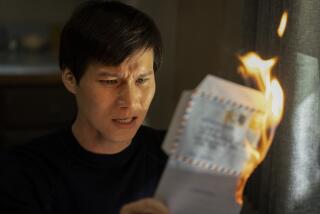In today’s TV shows, we like a little flaw with our heroes
Anyone tuning in to FX’s “The Americans” for some James Bond-style action will be sorely disappointed. In the first episode of the new season, Elizabeth Jennings (Keri Russell) gets the snot kicked out of her, and her husband ends up having to yank out her tooth. The Jennings’ are highly trained spies, but they are far from infallible.
“If we tried to have the Jennings’ get away with the stuff James Bond gets away with, it would be absurd,” says co-show runner (with Joel Fields) Joe Weisberg.
But the Jennings’ and their imperfect adventures are just one example of a shift being seen on television recently: After years of antihero characters saving the day with their genius brains and barbed personalities, the “smartest guy (and gal) in the room” trope seems to have run its course. These days, complex and human heroes are bucking the trend in both comedies and dramas — bright characters who may get the job done but more often than not bumble their way into the solution. And, frankly, we like them a lot better.
Full Coverage: Emmys 2015
“Audiences are waking up to this,” says Armando Iannucci, departing show runner of “Veep,” whose President Selina Meyer may not always be on the side of the angels but is worth rooting for. “A hero is someone you identify with, who has shades of error in them and who is a complicated human being. I wanted the show to be a slice of what D.C. is really like, and I was trying to avoid either an ultra-good or ultra-principled commander-in-chief who either goes on to fight aliens or turns into Nixon and conspiracies.”
Bruno Heller scripted one of those too-smart-to-relate-to guys when he created Patrick Jane in “The Mentalist,” and he says the exigencies of network television made it necessary to do so. “You have to make a decision between a Tony Soprano cable-type character — who has a certain American relish and appetite — or a big network character like Patrick Jane, who works [in syndication] in China and Brazil and France as well as in America. But it has changed now.”
As has Heller, who’s now written a more straightforward smart guy in James Gordon on “Gotham,” a character he calls the “John the Baptist to Batman’s Jesus.” “He’s an old-fashioned character, and there’s no irony in him. That’s deliberate. You can’t represent his values with irony — you have to believe them to represent them.”
Timeline: Emmy winners through the years
In addition, the industry runs in cycles. And after years of characters like “House’s” Dr. Gregory House and the (still beloved) Sherlock Holmes as played by Benedict Cumberbatch or Jonny Lee Miller, it’s time for a change.
“People want more inhabited, relatable storytelling,” says Jonathan Lisco, the show runner behind AMC’s “Halt and Catch Fire,” whose Joe MacMillan (Lee Pace) rallies others with the sheer force of his charisma yet often has little more than brio behind his visionary bluster.
“Sometimes at their worst, antihero story lines have a deus ex machina that resolves the story, and it plays as a weird dark triumph in the absence of meaningful experience,” adds Lisco. “People have seen a lot of that — and may be turning against that storytelling.”
Arguably, “Homeland’s” Carrie Mathison (Claire Danes) has straddled both sides of this smart-person divide: When the show premiered in 2011, she was portrayed as having a kind of sixth sense about spycraft, and the way her mind worked led her to be the best in her business. But over the seasons, audiences have learned that’s more of a delusion she’s maintained — in part thanks to her bipolar illness, which is more of the focus of the series today.
It’s a delicate shift that show runner Alex Gansa says they’re still teasing out. “Carrie is somebody who equates her genius with her manic state; the part that humanizes her is the opposite, when she begins to question who she is. She’s been released from a false world view of herself, and that opens entirely new possibilities for her.”
But don’t expect that the whole smartest guy (or gal) in the room is gone for good. Notes Weisberg, “What we liked about House wasn’t just that he was smart; he was so acerbic and smart it made him fun to watch. And most of those characters have a combination of traits that make them fun to watch — so I don’t think that’ll ever go away entirely.”
More to Read
From the Oscars to the Emmys.
Get the Envelope newsletter for exclusive awards season coverage, behind-the-scenes stories from the Envelope podcast and columnist Glenn Whipp’s must-read analysis.
You may occasionally receive promotional content from the Los Angeles Times.






